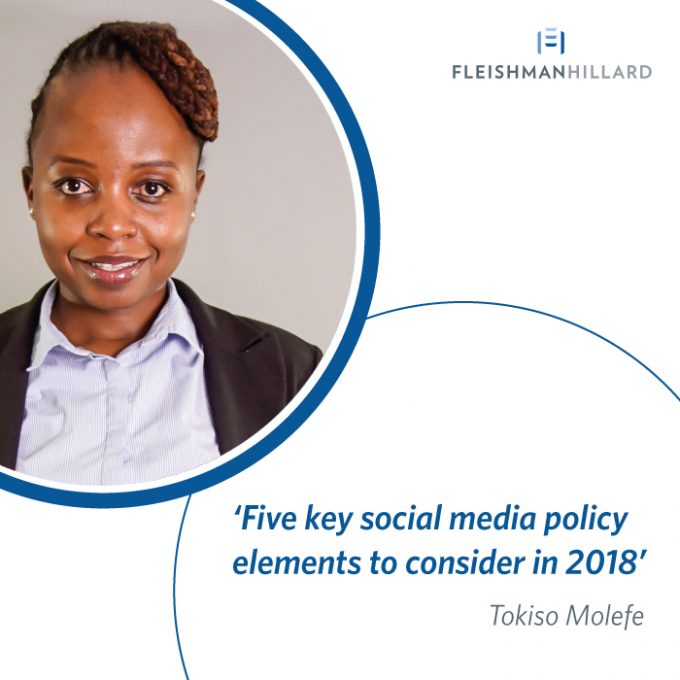Five key social media policy elements to consider in 2018
Twenty-seventeen was an unforgiving year for many companies on social media.
A PWC survey conducted in 2016/2017 found that 92% of South African CEOs were wary of social media and the possible risks involved with having a social media presence. MoneyWeb recently reported that social media crises cost South African businesses a minimum of R750 million since January 2016. In the article they highlighted that one of the causes of these crises was the underutilisation of social media policies. 
Most companies have some kind of social media policy – but it is usually a generic inclusion as part of the IT and HR policies. Considering the possible cost of a social media crises and the reputational damage it can inflict, 2018 is the time to reconsider what’s included in the policy.
Here are five key elements to consider:
- There is no excuse for hate speech
Racism, sexism, and homophobia were the biggest reputational crisis fire starters in 2017. The common ways hateful speech was revealed includes leaked emails, employees tagged in heated online conversations or a screenshot of a private WhatsApp conversation that has gone viral.
It is important to speak boldly against any form of hate speech that an employee might partake in. Although the situation can occur in a private setting, once leaked the trend is for people to find out everything about the accused, including where they work, and then bring the employer into the debate or issue on social media.
- You no longer work for us: so update your social profile!
This might not seem like a serious issue, but it can become one unnecessarily. If a former employee is somehow involved in hate speech online and their profile says they are still employed by your company, you could be needlessly drawn into a crisis situation.
- Crisis management
It is very important that in your policy you state that employees should not take the role of an unofficial spokesperson should the company find itself in a crisis. Although their sense of loyalty to the company is appreciated, responding to online attacks on behalf of the company could add fuel to the fire. Responses to social media posts must follow the official channels outlined in the social media policy.
- WhatsApp Conversations are not private
If your social media policy does state the do’s and don’ts of what can be discussed on WhatsApp groups, further reiterate the issue of hate speech and encourage employees to avoid discussing sensitive company or client information on this channel. WhatsApp gives a false sense of “privacy”. It is still a social network and the reality is that you never know who in the group could decide to share conversations with their network of people, or on platforms like Twitter.
- Refresh the policy and host social media awareness training regularly
Three months ago you could not save an Instagram story. Three months ago Twitter only allowed 140 characters in a tweet. Two months ago – you could not thread your tweets. Things change rapidly on social media. So, if you employees post a quick Instagram story today of something that shows confidential client information or is homophobic, sexist or racist, it can now have a long-term effect on your reputation and client relationships.
Employees are powerful and represent the company culture online. With the right guidance through social media awareness training, as well as refreshing the policy to align with changes, you empower employees to use social media responsibly.
Find Out More
-
Digital Insights Bulletin - October 2024
October 31, 2024
-
Sharon Piehl Wins 32nd Annual John D. Graham Award for Excellence
October 25, 2024
-
Digital Insights Bulletin - September 2024
September 30, 2024


